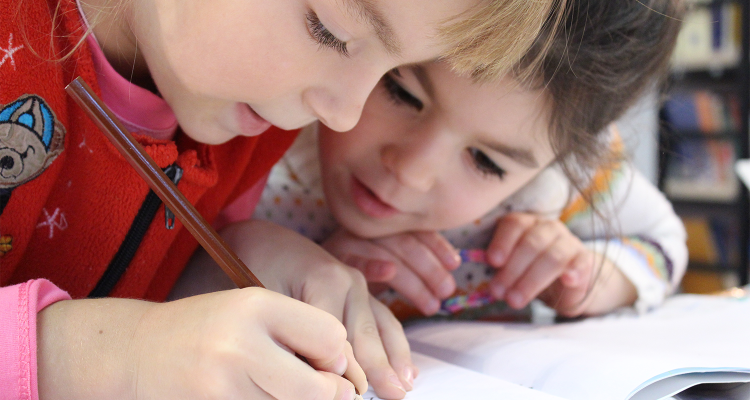Editor’s note: We’ve been at home with our kids for over seven weeks now, and heading to the end of the school year. But, here are some tips to get you through the homestretch.
No one was prepared for the challenges of teaching children at home. Teachers have changed their plans, knowing they can’t teach in person or provide any immediate feedback. Parents are struggling to learn concepts as well as platforms for completing the work. Students have had their entire world flipped upside down. The classroom and friends they are used to are now far away, and they must complete their work in an entirely new way.
While this unprecedented pandemic has changed the way our students learn and attend school, we can find a new normal. Kids thrive when they have a routine and a sense of what happens next. Parenting expert and author Dr. Laura Markham said, “Unpredictable changes erode this sense of safety and mastery and leave the child feeling anxious and less able to cope with the vicissitudes of life.” And this is a change on the scale few of us have ever experienced.
Parents are struggling along with their kids, but we can put some routines and expectations in place that help us all feel a little more normal and able to cope with these huge changes. As a mom of four school-age kids, our family has experienced many ups and downs in the past few weeks. My kids miss school, their teachers, their friends and the spring sports they were just starting. As parents, my husband is now working in a corner of our living room instead of the office he is used to. And, as a freelance employee, I’m trying to share my space and work time with five other people during the day.
Getting outside and enjoying the spring weather has been essential for our mental health. Every day, we try to get out to take a hike or ride bikes (just our family!). I’ve also created charts for each kid so they can easily see what schoolwork will need to be completed each week.
A LEARNING CURVE
Natalie Kovacs and her husband Joe have encountered a similar learning curve. She is an employee of Wheeling Heritage, and her husband works at home while her 10-year-old son Eliot completes his schoolwork. They have adapted to lesson plans and regular Zoom calls with the teacher.

Natalie shares a few strategies that has made their days more pleasant.
• We do essential schoolwork in the mornings and spread the extras throughout the day.
• Try to do at least one creative thing every day.
• Keep in touch with the teachers. Some of the ways they teach math is overly complicated to both my husband and I, so we’ve had to email his teacher a couple of times for guidance.
SINGLE PARENTING
According to U.S. Census data, about one-third of all children in the U.S. live with a single parent. The current health situation creates even more stress on those who are parenting without the support of another adult. They are balancing their own work or the stress of being newly unemployed with learning new systems to educate their children at home.
Single mother of three, Lisa Buckingham of Martins Ferry is navigating these changes on her own with her school-aged children. “The good part is that I don’t have to plan it out with another adult. On the other hand, I don’t get a break,” she says. After a few weeks of remote schooling, she has found a few things that work for her family.
• Have a schedule but keep it loose. The exact number of hours is less important. More important is that the kids know the plan and we all head into it together.
• Stay as positive as possible.
• Give each kid their own spot to work, preferably away from the others if possible.
• When school is done for the day, everything gets put away. Put it out of sight!
• Make time for myself every day. The next day is coming, and this school-from-home stuff is hard on everyone.

AN A+ FOR TEACHERS
The real heroes here are the teachers. They have jumped headfirst into a completely new way of teaching. With their education and experience, they have a few tips for parents and caregivers who have never taught a 5-year-old to read or a high school student to understand chemical equations.

Our elementary-aged kids have heard all the words — corona, pandemic, face masks — but probably don’t have a good grasp on what any of it means. What they do know is that they are no longer in school but are expected to complete work. Amy Yost is a first-grade teacher at Warwood Elementary and a mother of three. She offers a few tips when working with younger kids at home:
• Keep them entertained while they are learning. Want to practice math facts? Put post-its on the wall with numbers on them and shoot the answers with a nerf gun. Play a board game or bake to practice fractions and money.
• Stay active. Practice spelling words by manipulating your body to look like letters or have a dance party.
• Take breaks. The attention span just isn’t there. Do one subject and take a break.
• Let them teach. I told my students their parents or guardians have been out of first grade so long; they totally forget everything. I need my students to show them how to do the work.
TEEN ANGST
For older kids, relationships with their peers become even more essential for their health and wellbeing. Teenagers are forming their identity based on their peer groups and are suddenly stuck at home without their classmates. While technology can foster the continuation of these relationships, it can also take away from time they should be spending on schoolwork. Maryanne McGinley, a social studies teacher at Wheeling Park and mother of two, has a few reminders for parents of high school students.

• Parents need to stay involved. Keep tabs on the program (like Schoology) that your school is using to ensure the work is being completed and turned in. This is still school, and the assignments need to be turned in for them to pass the class.
• Provide motivation. This is new to everyone.
• Give kids a routine. Do so many hours of schoolwork then you are free to do what you want for a certain amount of time.
• Don’t stress about teaching. That’s what teachers are for. Keep in touch with teachers so they can address any concerns.
This adjustment has taken patience and adaptability from everyone. While we can’t meet in person to commiserate and collaborate, social media and the age of connectivity offers us something previous generations in crisis have never had — a community that is just a click away. Take advantage of the support from friends, family and educational professionals to make improvements and find as much success as you can.
Be gentle on yourself and your kids. We are learning together.
• Stacey Sacco is a Wheeling native. She is a content writer and the former production editor of InWheeling Magazine. She reluctantly left Wheeling in 2019 for her husband’s job and now lives in Fairfield, Pennsylvania, with her husband and four children.


